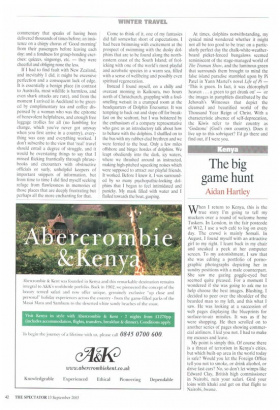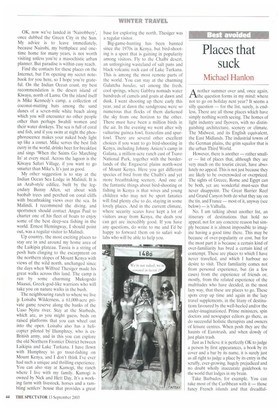The big game hunt
Aidan Hartley
When I return to Kenya, this is the true story I'm going to tell my muckers over a round of welcome home Tuskers. In London, in the fair postcode of W12, I use a web café to log on every day. The crowd is mainly Somali. In August, I found myself with an attractive girl to my right. I leant back in my chair and sneaked a peek at her computer screen. To my astonishment, I saw that she was editing a portfolio of pornographic photographs depicting her in sundry positions with a male counterpart. She saw me gazing goggle-eyed but seemed quite pleased. For a moment I wondered if she was going to ask me to help choose the best images. Blushing, I decided to peer over the shoulder of the bearded man to my left, and this what I saw. He was looking at a succession of web pages displaying the blueprints for surface-to-air missiles. It was as if he were shopping. He then scrolled on to another series of pages showing commercial airliners. I kid you not. I had to make my excuses and leave.
My point is simply this. Of course there is a threat of terrorism in Kenya's cities, but which built-up area in the world today is safe? Would you let the Foreign Office tell you not to smoke, or drink alcohol, or drive fast cars? No, so don't let wimps like Edward Clay, British high commissioner In Nairobi, ruin your safari. Gird your loins with khaki and get on that flight to Nairobi, bwana.
OK, now we've landed in `Nairobbery', once dubbed the Green City in the Sun. My advice is to leave immediately, because Nairobi, my birthplace and onetime home for many years, is not worth visiting unless you're a masochistic urban planner. But paradise is within easy reach.
Find the contacts for these places on the Internet, but I'm opening my secret notebook for you here, so I hope you're grateful. On the Indian Ocean coast, my best recommendation is the desert island of Kiwayu, north of Lamu. On the island itself is Mike Kennedy's camp, a collection of coconut-matting huts among the sand dunes of a seven-mile white beach along which you will encounter no other people other than perhaps Swahili women and their water donkeys. The sea is full of coral and fish, and if you swim at night the phosphorescence makes your naked body light up like a comet. Mike serves the best fish curry in the world, drinks beer for breakfast and sings 'When the Saints Go Marching In' at every meal. Across the lagoon is the Kiwayu Safari Village, if you want to go smarter than Mike's. It's just as good.
My other suggestion is to stay at the Indian Ocean Sea Lodge in Malindi. It is an Arab-style edifice, built by the legendary Bunny Allen, set about with baobab trees and perched on coral cliffs with breathtaking views over the sea. In Malindi, I recommend the diving, and sportsmen should contact Angus Paul to charter one of his fleet of boats to enjoy some of the best deep-sea fishing in the world. Ernest Hemingway, I should point out, was a regular visitor to Malindi.
Up country, the most exciting places to stay are in and around my home area of the Laikipia plateau. Tassia is a string of posh huts clinging to the escarpment on the northern slopes of Mount Kenya with views of the wild north, unchanged since the days when Wilfred Thesiger made his great walks across this land. The camp is run by some charming Mukogodo Maasai, Greek-god-like warriors who will take you on nature walks in the bush.
The neighbouring ranch to where we live ifs Loisaba Wilderness, a 61,000-acre private game reserve along the banks of the Uaso Nyiru river. Stay at the Starbeds. which are, as you might guess, beds on raised platforms that you can wheel out into the open. Loisaba also has a helicopter piloted by' Humphrey, who is exBritish army, and in this you can explore the old Northern Frontier District between Laikipia and Lake Turkana. I have flown with Humphrey to go trout-fishing on Mount Kenya, and I don't think I've ever had such a unique and thrilling experience. You can also stay at Kamogi, the ranch where I live with my family. Kamogi is owned by Nick and Hett Day. It's a working farm with livestock, horses and a rambling settlers' house that provides a great
base for exploring the north. Thesiger was a regular visitor.
Big-game-hunting has been banned since the 1970s in Kenya, but bird-shooting is a sport that is gaining in popularity among visitors. Fly to the Chalbi desert, an unforgiving wasteland of salt pans and black volcanic rock east of Lake Turkana. This is among the most remote parts of the world. You can stay at the charming Galatcha bandas, set among the fresh, cool springs, where Gabbra nomads water hundreds of camels and goats at dawn and dusk. I went shooting up there early this year, and at dawn the sandgrouse were so numerous that flocks of them darkened the sky from one horizon to the other. There must have been a million birds in the air. In the evening we went after wily vulturine guinea fowl, francolins and spurfowl. There are several other excellent choices if you want to go bird-shooting in Kenya. including Johnny Aniere's camp in Galana, a million-acre ranch east of Tsavo National Park, together with the borderlands of the Engaserai plains north-west of Mount Kenya. Here you get different species of bird from the Chalbi's and yet more breathtaking scenery. And one of the fantastic things about bird-shooting or fishing in Kenya is that wives and young children who may not be sport fanatics will find plenty else to do, staying in some lovely places. And in the current climate, where security scares have kept a lot of visitors away from Kenya, the deals you can get are incredibly good. If you have any questions, do write to me and I'd be happy to forward them on to safari wallahs who will be able to help you.



























































































 Previous page
Previous page